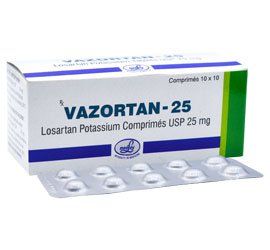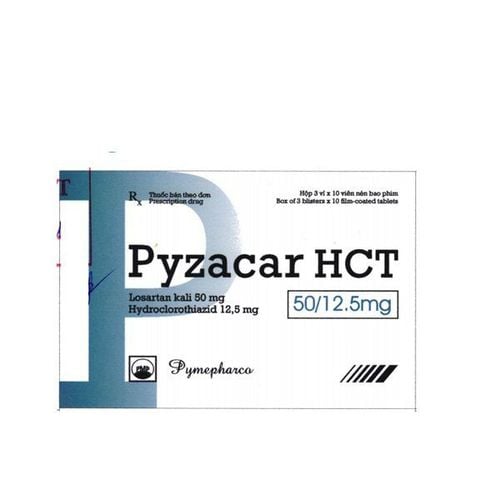This is an automatically translated article.
Angiodil is used to treat mild to moderate hypertension. The following article will provide you with the most detailed and important information about the drug Angiodil.1. What is Angiodil?
What is Angiodil? Angiodil is a drug containing the main ingredient Losartan Potassium, manufactured and registered by Ferozsons Laboratories., Ltd - Pakistan.
Pharmaceutical name: Angiodil drug. Ingredients: Losartan Potassium. Drug class: Cardiovascular drugs. Preparation: Film-coated tablets. Packing: Packed in a box of 1 blister x 10 film-coated tablets. Registration number: VN-9658-10. Manufacturer: Ferozsons Laboratories., Ltd - Pakistan. Registered company: Ferozsons Laboratories., Ltd - Pakistan.
2. What does Angiodil do?
Kalium Losartan is known as the first agent of a new drug used in the treatment of hypertension, and it is also an antagonist at the angiotensin II (type AT1) receptor. In addition, Kalium Losartan has the ability to reduce the combined risk of death from stroke, myocardial infarction, and cardiovascular disease in patients with hypertension combined with left ventricular hypertrophy. In addition, it also protects the kidneys for patients with type 2 diabetes with proteinuria.
The drug is indicated for the treatment of mild to moderate hypertension, alone or in combination with other antihypertensive drugs..
3. Dosage and way of taking Angiodil
Dosage and how to use Angiodil as follows:
Use with initial and maintenance dose: 25 - 50mg/day, once a day. If necessary, the dose can be increased to 100mg/day, once a day. Use for the elderly (over 75 years old), people with moderate to severe renal impairment or reduced endothelial fluid: Use with a starting dose of 25mg, once a day.
4. Note when using Angiodil
4.1. Contraindications Do not use the drug for patients who are hypersensitive, allergic to the ingredients of the drug, women who are pregnant or breast-feeding, children under 18 years of age.
Particular caution should be exercised when administering the drug to patients with intravascular volume depletion, renal artery stenosis, or liver failure.
4.2. Angiodil drug interactions when used together with some of the following drugs can cause interactions:
Rifampin, Barbiturates, narcotic sleeping pills. NSAIDs, K supplements, K-sparing diuretics, K salt substitutes. Lithium, Quinidine, Rossar Plus: Alcohol, Corticosteroids, ACTH, Muscle relaxants. Gout drugs, anticoagulants, anesthetics, glycosides, vitamin D. Cholestyramine/colestipol resin. 4.3. Side effects when using Angiodil During the use of Losartan Potassium, patients may experience side effects such as:
Chest pain, facial edema, flushing, tachycardia, Grade II A-V block, hypotension pressure, orthostatic hypotension, sinus bradycardia. Insomnia, anxiety, ataxia, confusion, dizziness, depression, headache, migraine, fever, dizziness, sleep disturbance. Gout, increased or decreased blood K. Loss of taste, loss of appetite, indigestion, flatulence, constipation, diarrhea, intestinal spasms, gastritis. Leukopenia, thrombocytopenia, agranulocytosis, hemolytic anemia, aplastic anemia, low hemoglobin and hematocrit. Leg pain, back pain, muscle pain, bone pain, muscle weakness, tremor, joint edema, fibromyalgia. Nasal swelling, cough, shortness of breath, sinusitis, bronchitis, rhinitis, nosebleeds, throat discomfort, airway swelling. Hyperuricemia or hypouricemia (when used in high doses), slight increase in creatinine/urea, urinary tract infections. Excessive hair loss, dermatitis, photosensitivity skin, rash, urticaria, erythema, bruising, rash. Slight increase in results when performing liver function tests or bilirubin, dermatitis, pancreatitis, intrahepatic cholestatic jaundice. Frequent urination, nocturia, kidney failure, interstitial nephritis, decreased libido, impotence. Reduced vision, blurred vision, burning and burning in the eyes, conjunctivitis. Sweating, tinnitus. Hyperlipidemia (when used in high doses), increased blood glucose. Hypercalcemia, hypomagnesaemia, hypomagnesaemia, hypochloremic alkalosis. We have just learned about the effects of Angiodil and important information that patients need to know. However, in order to ensure the effectiveness of treatment and safety when using, patients should only use the drug when indicated and guided by medical staff and specialists.
Follow Vinmec International General Hospital website to get more health, nutrition and beauty information to protect the health of yourself and your loved ones in your family.













